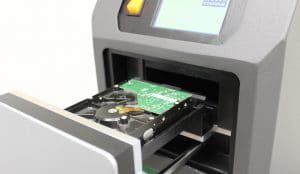 In today’s digital age, the majority of data is stored electronically in internet-based cloud software. Whether for convenience or accessibility, or due to physical hardware storage limitations, using a cloud to store data has become a norm for businesses, organizations, and individuals alike. And while cloud systems offer security measures that physical storage systems cannot, they also come with their own set of risks and security threats.
In today’s digital age, the majority of data is stored electronically in internet-based cloud software. Whether for convenience or accessibility, or due to physical hardware storage limitations, using a cloud to store data has become a norm for businesses, organizations, and individuals alike. And while cloud systems offer security measures that physical storage systems cannot, they also come with their own set of risks and security threats.
Moreover, the size and even financial power of an organization doesn’t necessarily equate to better and more secure methods of privacy protection for data stored in its cloud. Recent data breaches at large data centers like Experian, Facebook, and Target have proven that the proper protection of private and otherwise sensitive information is paramount, especially when stored electronically.
For healthcare providers, professionals, and clearinghouses (hereto referred as covered entities), HIPAA has specific regulations for safeguarding Protected Health Information (PHI), especially when it comes to the disposal of such sensitive and private data.
HIPAA Regulations & Best Practices for Data Disposal
 If you’re a covered entity and need to dispose of data containing PHI, you cannot simply abandon the PHI data or dispose of it using a public container like a dumpster that can be accessed by unauthorized personnel. The only time this is appropriate is if the PHI has already been rendered unreadable, indecipherable and otherwise cannot be reconstructed. In order to fully destroy this data, certain steps must be followed.
If you’re a covered entity and need to dispose of data containing PHI, you cannot simply abandon the PHI data or dispose of it using a public container like a dumpster that can be accessed by unauthorized personnel. The only time this is appropriate is if the PHI has already been rendered unreadable, indecipherable and otherwise cannot be reconstructed. In order to fully destroy this data, certain steps must be followed.
The HIPAA Privacy Rule requires the covered entity to implement appropriate physical (e.g., facility access and control; workstation and device security), technical (e.g., access control; audit controls; integrity controls; transmission security), and administrative (e.g., security management process; security personnel; information access management; workforce training; policy and procedure evaluation) safeguards for PHI to avoid prohibited as well as incidental use and disclosure of the PHI data. See 45 CFR 164.530(c).
 This Rule holds especially true with the disposal of PHI and requires the covered entity to not only destroy the electronic PHI (ePHI) and the hardware or electronic media it is stored on, but to first properly dispose of the ePHI data on the media before that media is made ready for reuse.
This Rule holds especially true with the disposal of PHI and requires the covered entity to not only destroy the electronic PHI (ePHI) and the hardware or electronic media it is stored on, but to first properly dispose of the ePHI data on the media before that media is made ready for reuse.
In addition, the HIPAA Security Rule also requires the covered entity to set policies and procedures for the disposal of ePHI. As part of this mandatory safeguard process, covered entities must also train their workforce members on the proper disposal policies and procedures erected and enforce these policies. See 45 CFR 164.310(d)(2)(i).
It is up to the covered entity to determine a method of data destruction and disposal, by assessing their own potential risks to patient privacy as well as the form, type, and amount of PHI collected and stored. For instance, PHI such as name, social security number, driver’s license number, diagnosis, or treatment information are examples of sensitive information that may necessitate more care with regard to disposal. HIPAA does not require one method of data destruction and disposal over another, so long as the Security and Privacy Rules are followed.

In the case of ePHI, whether on hardware or in an internet cloud system, proper HIPAA disposal methods include overwriting non-sensitive information with software or hardware to clear the data, degaussing the media and rendering the magnetic field permanently unusable, or destroying the media by shredding, melting, pulverization, disintegration, or incineration. You may also opt to maintain a secure area for PHI disposal and/or you are permitted to work with a disposal vendor like SEM to destroy the PHI on your organization’s behalf (so long as there is a written agreement or contract authorized by both parties). There are no set HIPAA rules for how employees or workforce members dispose of PHI; if you have off-site employees who use PHI or ePHI, you can require that they return all PHI to your organization for proper disposal.
Failure to adhere to the HIPAA Security and Privacy Rules could result in unlawful release of PHI, and consequently, the potential for identity theft, employment discrimination or even harm to the individual’s reputation.Moreover, the covered entity can face serious penalties for noncompliance.
Penalties for Noncompliance
 In tandem with the Department of Justice, the Department of Health and Human Services (HHS) and its Office for Civil Rights (OCR) are responsible for the administration and enforcement of the HIPAA Security and Privacy Rules for the disposal of PHI.
In tandem with the Department of Justice, the Department of Health and Human Services (HHS) and its Office for Civil Rights (OCR) are responsible for the administration and enforcement of the HIPAA Security and Privacy Rules for the disposal of PHI.
Failure to comply with the HIPAA Security and Privacy Rules can result in an investigation and audit, and in some circumstances civil and criminal penalties. Factors such as violation date, whether the covered entity was aware of the failure to comply, or whether the failure to comply by the covered entity was willful neglect will determine the end consequence of the violation to either the Privacy or Security Rule.
If found guilty or in violation of either Rule, civil money penalties of $100 up to $50,000 per violation (and not exceeding $1,500,000 per calendar year for multiple violations) can be imposed. A civil penalty may not be imposed under certain circumstances, such as: the failure to comply was not due to willful neglect and was corrected during a 30-day period from the date in which the violation occurred; if the Department of Justice has imposed a criminal penalty; or, if the OCR chooses to reduce the penalty due to reasonable cause in the covered entity’s failure to comply, in that the penalty would be excessive given the nature and extent of the noncompliance.
 In addition, criminal prosecution, in the form of a fine of $50,000 and up to one year of imprisonment, can be mandated for a person who knowingly obtains or discloses PHI and ePHI, which can occur as a result of improper disposal of the PHI. The criminal penalty increases to $100,000 and up to five years of imprisonment if the violation involves false pretenses, and to $250,000 and up to 10 years of imprisonment if the wrongful act involves the intent to sell, transfer or use the PHI for commercial advantage, personal gain, or malicious harm.
In addition, criminal prosecution, in the form of a fine of $50,000 and up to one year of imprisonment, can be mandated for a person who knowingly obtains or discloses PHI and ePHI, which can occur as a result of improper disposal of the PHI. The criminal penalty increases to $100,000 and up to five years of imprisonment if the violation involves false pretenses, and to $250,000 and up to 10 years of imprisonment if the wrongful act involves the intent to sell, transfer or use the PHI for commercial advantage, personal gain, or malicious harm.
One last note: the HIPAA Privacy Rule does not include requirements for the length of time medical data like PHI should be retained before disposal. Instead, check with your state’s laws for medical record retention rules before disposing of any data.

